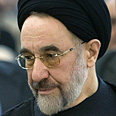
Mohammad Khatami
Photo: Reuters
Former Iranian President Mohammad Khatami, who oversaw a thaw in ties with the West when in office from 1997 to 2005, announced on Sunday he will run for the presidency again in the June election, political allies said.
The race will pit him against President Mahmoud Ahmadinejad, who often rails against Western powers. Since Ahmadinejad took office in 2005, ties with the West have deteriorated as tensions over Iran's nuclear ambitions have mounted.
Politics
Joint statement by world powers calls for 'diplomatic solution based on dual track strategy'
Mehdi Karubi, head of Iran's Etemad Melli (National Trust) Party, who also announced he would be seeking the presidency, is expected to withdraw from the race following Khatami's bid.
The West accuses Iran of seeking to build nuclear weapons, a charge Tehran denies, insisting its aim is to make electricity. But Tehran's failure to convince world powers about its intentions has led to three rounds of UN sanctions.
US President Barack Obama has offered a new US approach to engage Iran, saying he would extend a hand of peace if the Islamic Republic would "unclench its fist".
But some analysts say Washington may wait until the June result before spelling out any offer in detail. Iran, meanwhile, has set tough conditions for opening any dialogue, a move seen as a bid to buy time in part because of the pending vote.
Khatami worked for detente abroad and for political and social change at home while in office. But hardliners in charge of major levers of power in the Islamic Republic blocked many of his reforms, costing Khatami some key supporters.
Ahmadinejad has faced mounting criticism over his economic management and surging inflation, which climbed to almost 30 percent last year. Reformists, in particular, say his fiery foreign policy speeches have further isolated Iran.
Khatami's bid is likely to polarize the race, in which others have already declared, and may encourage conservatives to unite to prevent a reformist winning even though some of them have also criticized Ahmadinejad.
But analysts say the result of the vote could hinge on whether Ahmadinejad retains support of Supreme Leader Ayatollah Ali Khamenei, Iran's top authority who has publicly praised the president and whose words could sway millions of loyalists.
Ahmadinejad may also be able to call on the backing of Iranians in poorer and particularly rural areas where the impact of his spending has been most obvious, analysts say, although they add that his largesse is why prices have climbed so fast.
Although many of Khatami's reforms were blocked, such as a law to ease press restrictions, the media did become more vibrant during Khatami's term – even if many newspapers were banned – and some social strictures did loosen.
But some of Khatami's main supporters became disillusioned with him by the end of his presidency, saying he should have done more to push through change. Students, who were once at the vanguard of the reform movement, have now fallen largely silent.
Iranian presidents can serve two consecutive four-year terms but must then step down. They can run again at a later date.
Dudi Cohen contributed to this report















